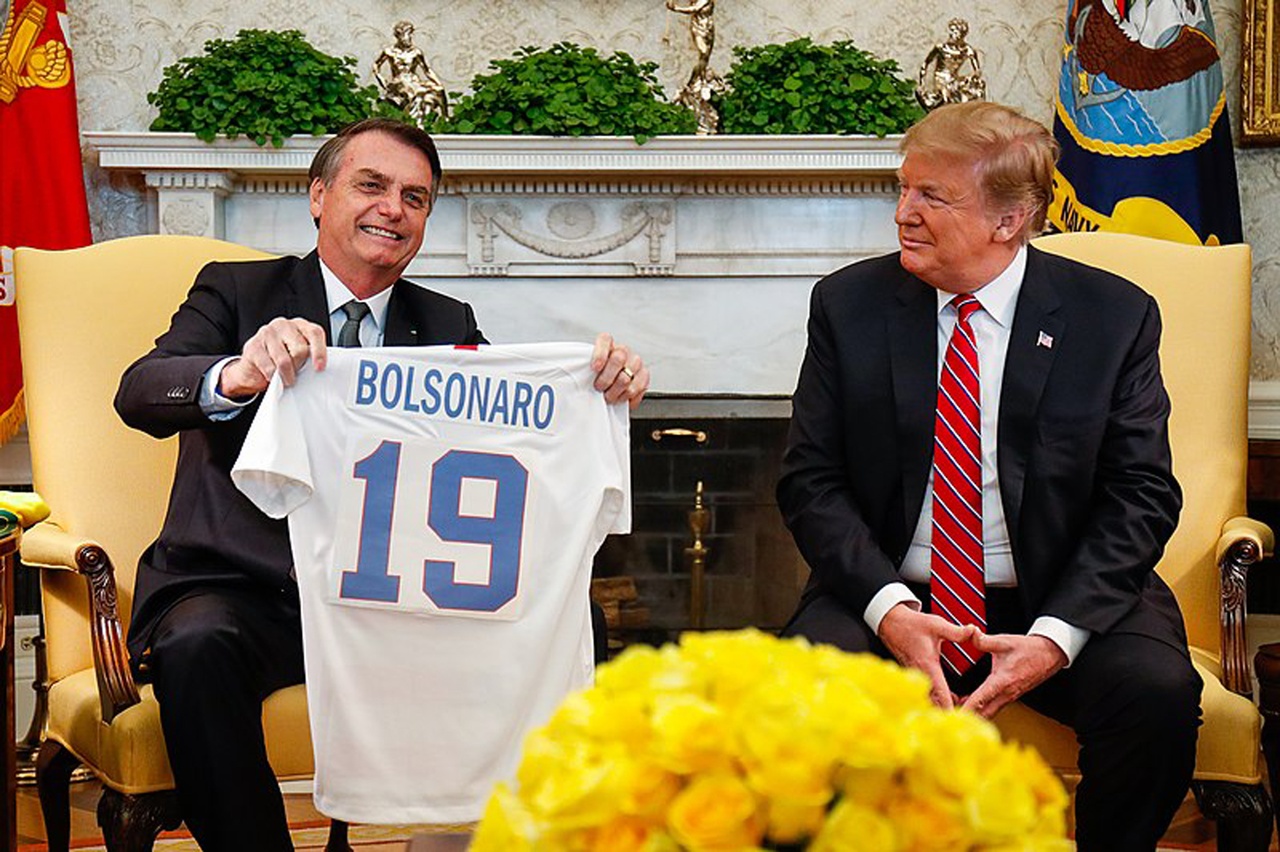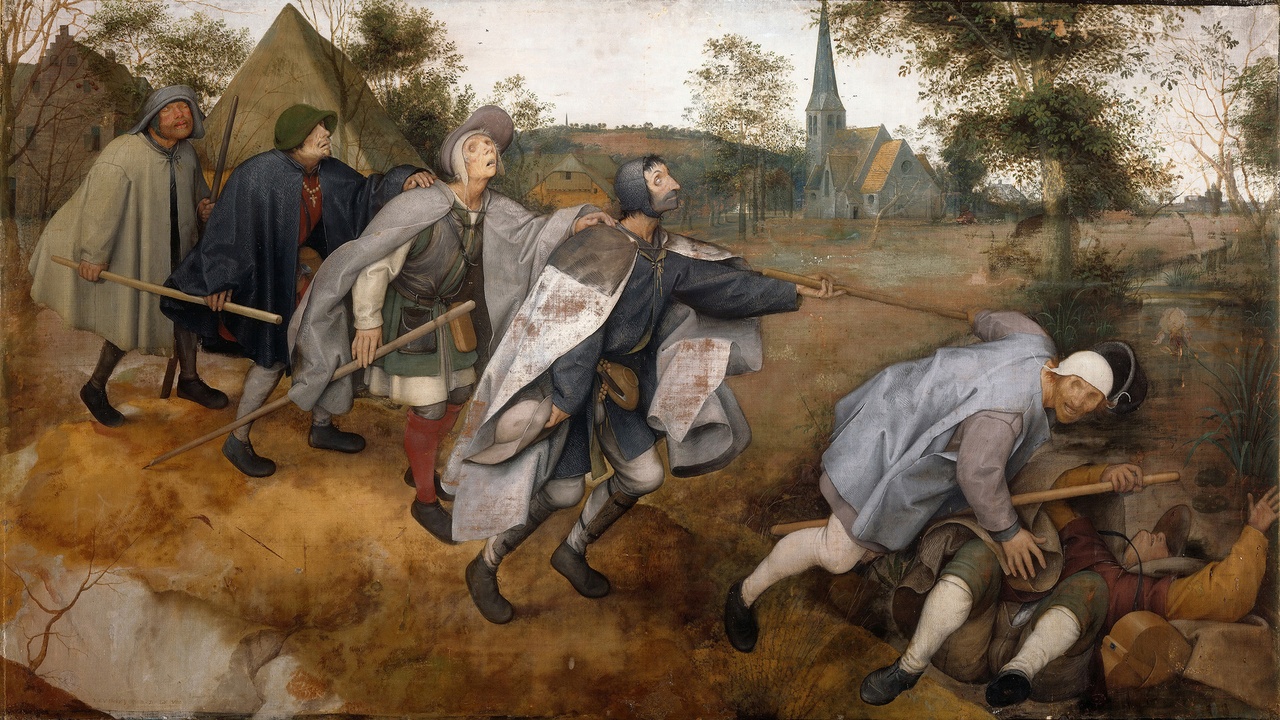Talking about Evil Reflections on Moral Judgment

Brazilian President Jair Bolsonaro’s first appearance on the international stage, at the World Economic Forum in Davos in January 2019, was a thorough disappointment. His bizarre performance left an audience that was ready to embrace or even praise him alarmed. And yet, as a German newspaper reported, some attendees “saw a silver lining in the fact that the Brazilian right-wing populist flunked this major test. ‘There it is again,’ a German chief executive who witnessed the scene said with a chuckle, ‘the banality of evil’.” [1] The unnamed executive’s smugness is even more appalling than the object of his scorn. Does such a demonstratively blasé attitude not actually signal the same helplessness that has also been the source of a steady stream of sincere outrage from civic-minded commentators in German features sections and patriotic pundits for liberal American papers; outrage at the radical evil we seem to be confronting in figures like Bolsonaro and Donald Trump?
In philosophy, to pass moral judgment is simply to cease trying to understand the other. And because the process of understanding can only consist in an incessant and interminable interrogation of one’s own ideas, moral judgment also puts self-critique on trial. Once I believe the other to be evil, I need to ask no further questions: she is evil, succumbs to her inexplicable proclivity for evil, her evil nature, which in passing judgment I declare to be beneath me.
Moral judgment is by definition self-righteous, and by definition does not do justice to the other. Its public proclamation, however, can be a legitimate and rational political strategy, although then, as a show trial, it is not a moral judgment. On the other hand, as long as judgment is not declared publicly, there is little reason to pass it. If I think that the effort to understand the other, to understand all those drives and motives that are ultimately not hers, is bound to fail, then the other becomes my political enemy and not an evil person. Such political judgment has the advantage that it is grounded in my own political interest and not in an inexplicable proclivity of human nature. In the future, at least, I will be free to call into question this interest and the actions and judgments to which it gave rise.

Pieter Bruegel, „Der Blindensturz / The Blind Leading the Blind“, 1568
In the face of one of the greatest and most incomprehensible crimes in history, Hannah Arendt questioned the political strategy of the show trial, seeking to advance the process of understanding and move beyond the all-too-reassuring notion of a natural proclivity for evil. And yet she cannot and will not abandon the discourse of evil altogether. In light of the “law of mass murder,” that discourse serves an important function for political stabilization: above and beyond the “‘consciousness of guilt’ required by law,” Eichmann’s judges had to attribute evil intentions to him. Even if, like Arendt, one jettisoned the notion of a “diabolical or demonic profundity” in favor of the “banality of evil” – which Arendt once defined as a special form of “stupidity,” the “unwillingness to ever imagine what is actually going on with the other” [2] – there could be no sense of justice and no justice without moral judgment. After the Second World War, there were no doubt good reasons for a moral perspective on the crimes of National Socialism. Confronted with today’s resurgence of fascism on both sides of the Atlantic, however, we need to radicalize Arendt’s impulse: more than ever, the incomprehensibility of the Nazis’ crimes must be the ground and mainspring for an open-ended process of understanding the political, social, and economic context. Its objective is not to reduce past crimes to that context, let alone justify them, not to “[explain] away the responsibility of the doer for his deed in terms of this or that kind of determinism,” [3] but to avert present and future menaces.
Kant emphasizes that only a person’s convictions can be called good or evil, not his or her deeds, and so “the judgment that the agent is an evil human being cannot with assurance be based on experience.” [4] He admits the possibility of such judgment for the purpose of a “religion within the bounds of bare reason,” which is to say, for purposes that are political in the broadest sense, but it remains true that for philosophy, which should abstain from the reassuring assumption of a proclivity for evil that is inexplicable, the boundary between morality and politics coincides with that between self and other. Yet “one cannot observe” evil with absolute certainty, cannot “even always” recognize it “within oneself,” on this side of that boundary, as Kant notes: [5] Who could claim to know all the drives that found realization in their own deed? Who could claim to be utterly transparent to herself? And if I cannot judge myself or another to be evil, does the discourse of good and evil actually make any sense other than in the political sense of reassurance and stabilization? Is not then morality the true “opiate of the masses?”

Anna Maria Maiolino, „O Herói“, 1966
In an essay written a few years after the war and titled “The I and Totality,” [6] Emmanuel Levinas gave an unexpected and radical account of the relation between politics and morality. Levinas’s work is generally associated with the idea of a radical ethics, with an intimate and nonviolent relationship to the other, a relationship “from face to face” that is sparked by an exceptional event, an instant at which my existential dependence on the other in all my acting and thinking precipitously irrupts into my own world. Only in such a suddenly revealed “intimate society,” Levinas argues, is any moral relation possible; only here can I devote myself to the heroic process of understanding the other. However, the attempt to do justice to the other in this interminable process of understanding, of self-critique, is itself – and therein lies the unexpected and radical quality of Levinas’s teaching – already unjust, because it always excludes a third party, because the openness to an other always implies closure to the plural and manifold other in infinite other ways. The disengagement of the “intimate society” from society at large is an illusion – an illusion that, in the best case, may be seen as having political value: in the best case, this disengagement interrupts and suspends the course of history in order to subject my own political action to radical self-critique. Does the latter truly aim to do justice to an other who is other in infinite ways?
In contradistinction to moral judgment, which can have political value only as show trial, self-critique loses all value when it is publicized, as in media-savvy gestures of self-chastisement and cheap confessions of guilt toward “underprivileged” minorities. What Levinas envisions is neither a moral spectacle nor unworldly moral navel-gazing: it is an effort to challenge my own convictions, which are made possible by an artificial and untenable isolation from the economic, social, and political realities around me: a trial of my own convictions that is the diametrical opposite of the political show trial. The “intimate” relationship with an other that excludes all others makes sense only as a facet of my political action that I call into question at that same instant: “I don’t live in a world in which there is but one single ‘first comer’; there is always a third party in the world: he or she is also my other, my fellow.” [7] That is why, in and of itself, self-critique is no less unjust than moral judgment: when it does not serve other – political – purposes, it becomes a form of abstract – moral – navel-gazing and mere charity, which can, at most, be of intrinsic political value as a popular metaphysics, a provisional surrogate for the trial of convictions.
The entire domain circumscribed by the terms good and evil appears here as a precarious artificial clearing that will be swallowed up only moments later by the jungle of relationships with the finite but incomprehensibly multitudinous others in their infinitely diverse otherness. Doing justice to the other would mean being just toward all at once and equally, untangling the jungle so completely that it would consist only of perfectly straight trees growing at equal distances. [8] Because this vision of a perfectly uniform forest is just as untenable as that of a precarious moral clearing, because the supposition of an ethical and nonviolent relationship will always be a dangerous political illusion, justice, Levinas argues, “can have no other object than economic equality,” [9] which is to say, a state of affairs that is at least unjust in equal fashion. That is Levinas’s conception of politics, which precedes the “ethical instant” whose perpetual challenge it must embrace and to which it must constantly seek to return if it is to be just.

Michael Haneke, „Das Schloss“, 1997, Filmstill
The terms good and evil, that is to say, do not designate anything, are not descriptive for anyone’s convictions, and yet their use can make political sense: in narrating a history that satisfies the tangible and hence rigorous criteria, the exigencies of the concrete economic, social, and political situation. The talk of individual moral guilt that Marx once urged his readers to avoid [10] may have made sense in certain situations, but today the unending outraged cries of “How could he?” would seem to serve only to reassure liberal newspaper readers of their moral superiority. There may have been a time when the remark by Trump’s ghostwriter that the future president was “the most purely evil human being I’ve ever met” [11] would have had a mobilizing effect; in the so-called post-factual age, it appears to be nothing but fodder for the widely noted confirmation bias. Yet if the moral explanation of evil seems to have lost all force, so does the psychologizing explanation that the notion of confirmation bias reflects. Like the Stanford Prison Experiment, [12] it belongs to an order of popular-scientific models that identify the nature of the social as the origin of evil; models that are perfectly plausible and always appear to be correct, but do not actually explain anything. Like the moral perspective, it stops with an invariant and ahistorical essential “nature,” though in this case the latter realizes itself not in the individual but in the dynamic of groups or entire societies, which have the capacity to transform even the most ordinarily timid and small-minded human into a monster once a certain stage of organizational or technological development is achieved. This version of the discourse of the banality of evil, which is itself banal, is at best capable of describing how fake news spreads, how the “common man” turns into a fascist, but it cannot explain why. At its worst, it obscures the underlying reasons for the functioning and efficacy of so-called “post-factual” discourse, interpreting, for example, the restoration of the postcolonial extractivist economic and social order under Bolsonaro as a mere technical glitch, a failed WhatsApp experiment.
And yet, despite everything, the discourse of evil is not altogether replaceable. It is needed, and not only as a political strategy. Now and then it can state the sinister and incomprehensible, and initiate the process of understanding instead of aborting it. After all, do we have another word for what is so disconcerting about all those attempts to expose the rot in human nature, in society, and in law? When the land surveyor K. arrives at the timeless and placeless scene of action in The Castle, Kafka has the “quiet man” say, as though by way of a greeting, “Hospitality isn’t a custom here, and we don’t need any visitors.” [13] True, he is not speaking of evil, and even less so is he passing moral judgment. Rather, the disquieting, sinister aspect of the scene lies in the fact that evil is nonetheless present, that it is nonetheless spoken. Yet this same sinister aspect, which is where the essence, the “Kafkaesque” quality of his œuvre is generally believed to reside, has aged poorly and lost its power to upset: the maquiladoras of the half-fictional Mexican town Santa Teresa in Roberto Bolaño’s 2666 strike today’s reader as more disturbing than the unlocatable and impenetrable castle. Here, in “La parte de los crímenes” (The Part about the Crimes), the fourth part of Bolaño’s magnum opus, evil is both more concrete and less tangible: it has its origin not in the essence of power but in the specific economic and historical conditions, in the exploitative capitalism of the region along Mexico’s northern border, as well as in the abject machismo that Bolaño hints at by drawing up the cruel balance sheet of the widely discussed femicides of Ciudad Juárez. There is no murderer and no perpetrator profile, no motive, no psychological sketch, and no discernible system, only the enumeration of crimes, only the unending list of dead women – and all those women “who didn’t make it onto the list or were never found, who were buried in unmarked graves in the desert or whose ashes were scattered in the middle of the night, when not even the person scattering them knew where he was, what place he had come to.” [14] Evil remains unspoken: it explains nothing and nothing explains it. Bolaño describes it as that which the concrete analysis of the economic, political, and social situation must aim at precisely because it eludes its grasp. Without speaking evil’s name, he states the incomprehensible that propels not only understanding but also the self-critique that interrupts the process of understanding and prevents it from settling on a reductive and reassuring explanation.
And the moral of the story? What walked onto the stage of the Davos Forum in January 2019 in the guise of the newly elected Brazilian president was not the banality of evil but the entire history of Brazil: far from being one in a series of glitches to which one might respond with cynical indifference or moral outrage, it was the next chapter of a history that conforms so little to the classical theories of development that any change, even national independence and the abolition of slavery, has merly served the reproduction and stabilization of a structure that has for centuries translated international dependency and the internal structures of a society into one another.
Translation: Gerrit Jackson
Title image: Jair Bolsonaro and Donald Trump in Washington, 2018
Notes
| [1] | Olaf Gersemann/Holger Zschäpitz, “Brasiliens ‘Mini-Trump’ verpatzt eine einmalige Chance,” https://www.welt.de/wirtschaft/article187523506/Weltwirtschaftsforum-Jair-Bolsonaro-verpatzt-seine-Chance-in-Davos.html. |
| [2] | Hannah Arendt/Joachim Fest, Eichmann war von empörender Dummheit. Gespräche und Briefe, ed. Ursula Ludz/Thomas Wild, Munich: Piper, 2011, p. 44. |
| [3] | Hannah Arendt, Eichmann in Jerusalem: A Report on the Banality of Evil, rev. ed., New York: Viking Press, 1964, p. 290. |
| [4] | Immanuel Kant, Religion within the Bounds of Bare Reason, trans. Werner S. Pluhar, Indianapolis: Hackett, 2009, p. 20. |
| [5] | Immanuel Kant, Religion within the Bounds of Bare Reason. |
| [6] | Emmanuel Levinas, “The I** and the Totality,” in: Entre nous: Thinking-of-the-other, trans. Michael B. Smith/Barbara Harshav, London/New York: Continuum, 2006, pp. 11–33 [“Le Moi et la Totalité,” in: Entre nous: Essais sur le penser-à-l’autre, Paris: Éditions Bernard Grasset et Fasquelle, 1991, pp. 23–48]. |
| [7] | Emmanuel Levinas, “Philosophy, Justice, and Love,” in: Entre nous: Thinking-of-the-other, pp. 88–104, quote p. 88 [“Philosophie, Justice et Amour,” in: Entre nous: Essais, pp. 113–31]. |
| [8] | Kant’s theory of politics is based on the assumption that “nothing straight can be constructed from such warped wood as that which man is made of.” He nonetheless relates a universal history of humankind that, behind the backs of its protagonists and entirely independent of their deeds and convictions, unites humans in a forest in which the individual trees “grow beautiful and straight – whereas those which put out branches at will, in freedom and in isolation from others, grow stunted, bent and twisted.” Immanuel Kant, “Idea for a Universal History with a Cosmopolitan Purpose,” in: Political Writings, ed. H. S. Reiss, trans. H. B. Nisbet, 2nd ed., Cambridge: Cambridge University Press, 1991, p. 46. |
| [9] | Emmanuel Levinas, “The I and the Totality,” p. 31 [“Le Moi et la Totalité,” p. 46]. |
| [10] | Karl Marx, Capital: A Critique of Political Economy, vol. 1, trans. Ben Fowkes, ed. Ernest Mandel, London: Penguin Classics, 1990, p. 92. |
| [11] | https://www.reddit.com/r/politics/comments/d6ges4/im_tony_schwartz_and_i_ghostwrote_trump_the_art/. |
| [12] | The demonstrably spurious Stanford Prison Experiment has served for decades as an equally popular and nonsensical explanation for what has generally been taken to be the “banality of evil”: the notion that evil lies dormant within every one of us and can be brought out at any time by a “toxic” social situation. The observed cruelty of the guards toward the prisoners, which has become a staple of pop culture and circulates in common knowledge in diverse variations, was actually a product not so much of human nature as rather of the lead experimenter’s simplistic systemic critique. |
| [13] | Franz Kafka, The Castle, trans. Anthea Bell, Oxford/New York: Oxford University Press, 2009, p. 15. |
| [14] | Roberto Bolaño, 2666: A Novel, trans. Natasha Wimmer, New York: Farrar, Straus and Giroux, 2008, pp. 353–54. |
